"Is it time for a 'Building Safety Act' in Nigeria?"
- Jan 29, 2023
- 8 min read

What will it take to ‘normalise’ the creation of better, safer, smarter buildings and connected infrastructure, across Africa? _ Abisogun OBE
After a tortuous period, thus far in excess of 67 months, since that fateful day on 14th June 2017, there remains just over sixty (60) days left, before the April 2023 window opens. I am referring to the inaugural opportunity under the new Building Safety Act (2022) for an Accountable Person ‘AP’ to register, with the ‘new’ Building Safety Regulator, an ‘in-scope’ existing asset, domiciled in England. The introduction of the ‘three gateways’ of planning, design, and construction, to facilitate safe and proper occupation of every ‘higher-risk residential building’(s), has now been mandated into law.

Credit: BIM Academy
The potential impact of this ‘generational reform’ will be wide ranging and hugely impactful; and I truly believe that moving forward, new ‘data-driven, digitally enabled’ business models, will be the only way to effectively compete and deliver, across the UK construction sector. At its core is the legal requirement to "create, hold and maintain the golden thread of information management, in an accessible and digital format".

Credit: BIM Academy
2023 is the year that we all [willingly or otherwise] commit and enter an era of ‘regulatory compliance’ through #digitalconstruction. At last, business as usual, potentially across the globe, has ‘officially and unapologetically’ been completely disrupted; its job done, yet it’s only the beginning for a new way of planning, designing, constructing, and maintaining built assets.

Credit: Estate Intel
But today 29th January 2023 is yet another significant milestone, as I recall my own ‘personal’ achievement and intention on this day, twenty (20) years ago. Yes, on the [29.01.03] I began a challenging and hugely rewarding construction management ‘CM’ career; inspired by the story and a face-to-face meeting with Herman Russell Jnr [RIEP]. Back then I had hoped to become the largest Black owned Contractor in London; I know – but we can and should always aim high! And, for those that don’t know, HJ Russell was back then, the largest Black owned Contractor in the United States, and according to the Black Enterprise 'BE' 100’s. As a young upcoming budding contractor, I wanted and had hoped to achieve a similar success in the UK – even in the absence of any form of ‘legislated’ affirmative action / set aside contracts or tangible commitment to Supplier Diversity in the UK.

Credit: HJ Russell Family
However, twenty years later, stirred but not shaken, humbled and fully dusted down from the many scrapes and bumps along the way, now with an evidence-based level of ‘industry insight and procedural granularity’ that would scare many, I have a complete 360 view – as a PQS turned Contractor and Construction Manager ‘CM’. Today, I am rather conveniently [as God has ordained], armed with a drive, vision, commitment, perspective and lived experience that has trained and equipped me with an agile ‘use-case’ fit for a ‘second career’ in #digitalconstruction.

Credit: BIM Academy
The excitement that consumed me on 29.01.03 when I first registered my company Urbanis Limited was one of excitement and pent-up nervousness; I never knew whether I would succeed or fail – but I just had to try and thank God, with my commitment to creating #SocialValue and seeking to uplift others [mostly young people], it was entirely worth the effort [and pain] and now safely recorded in the history books, duly acknowledged by the late HMQEII [RIEP].
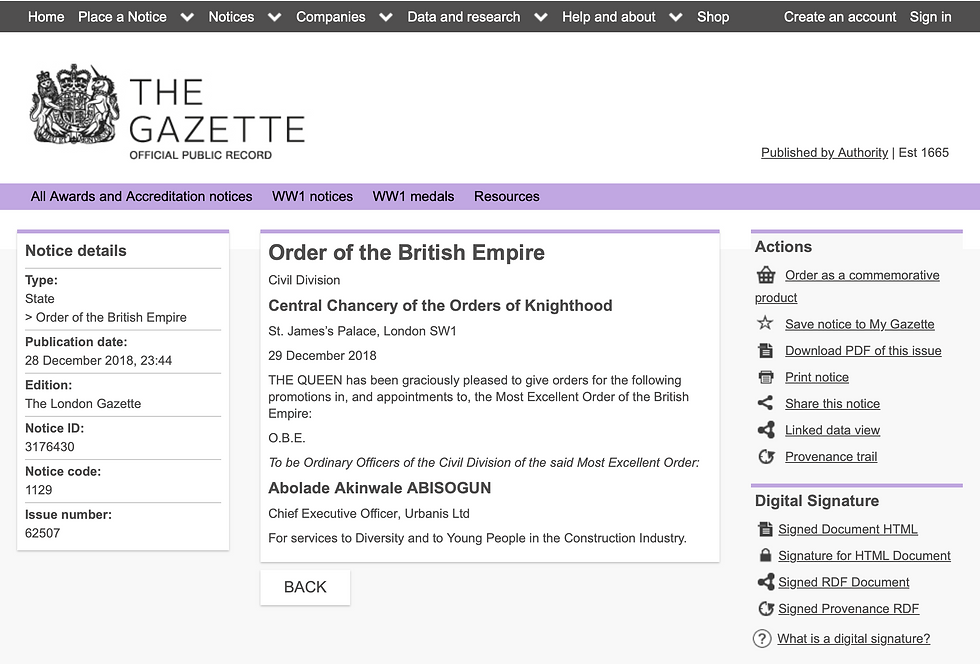
Construction [not Surveying] is and will always be ‘my first love’ [and thanks to Mummy, I’m still very much a child of LEGO aka MMC]. Following professional qualification in 1999 as a Chartered Quantity Surveyor, and successful periods overseas, in the Middle East / Sub-Saharan Africa concluding with a stint in Atlanta, Georgia; I returned to the UK to successfully begin delivering repairs & maintenance contracts and new-build projects as a quasi PQS/CM for both public and private sector clients, across London and the UK.

Credit: BBC NEWS Pidgin [November 2021]
The ‘dysfunctional ills’ that continue to permeate across the sector in the UK, due principally to a ‘broken procurement / delivery model’ a general ‘lack of ethics’ or any meaningful definition of collaboration, across client teams; remains a matter of increasing importance and concern to many. The reality is, this is NOT a UK-centric conversation, it’s a global, nuanced conversation and one that continues to reveal common denominators across the world.
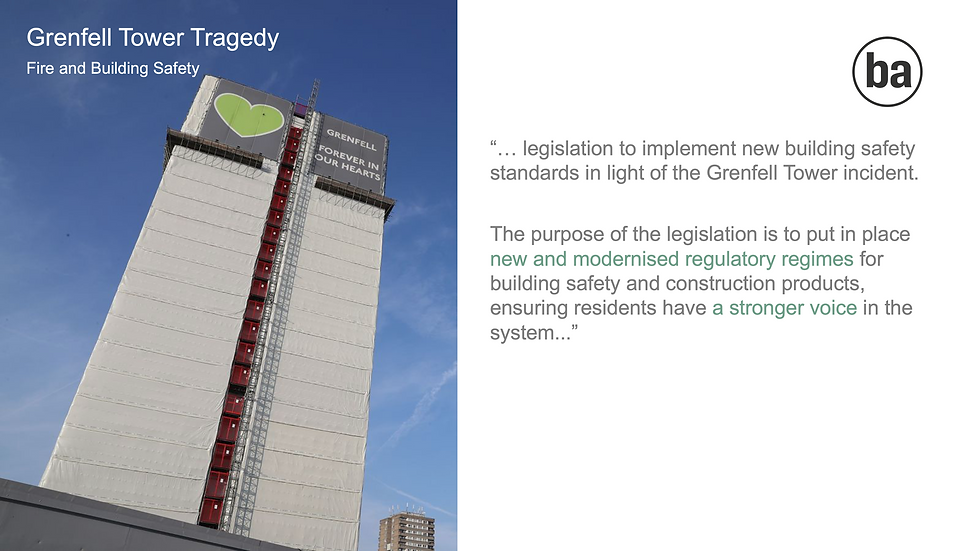
Credit: BIM Academy
As we look towards the wider 2040 ambition and an ESG-led, Net Zero and Decarbonisation challenge across the City of London, we must start to really question our cultural behaviours and values as built-environment professionals. This was recently discussed in my capacity as Chair of the UK&I RICS WBEF _ panel discussion held on 18th January 2023, which was titled: Building better places and better-connected spaces – Construction and Infrastructure.

Credit: RICS WBEF
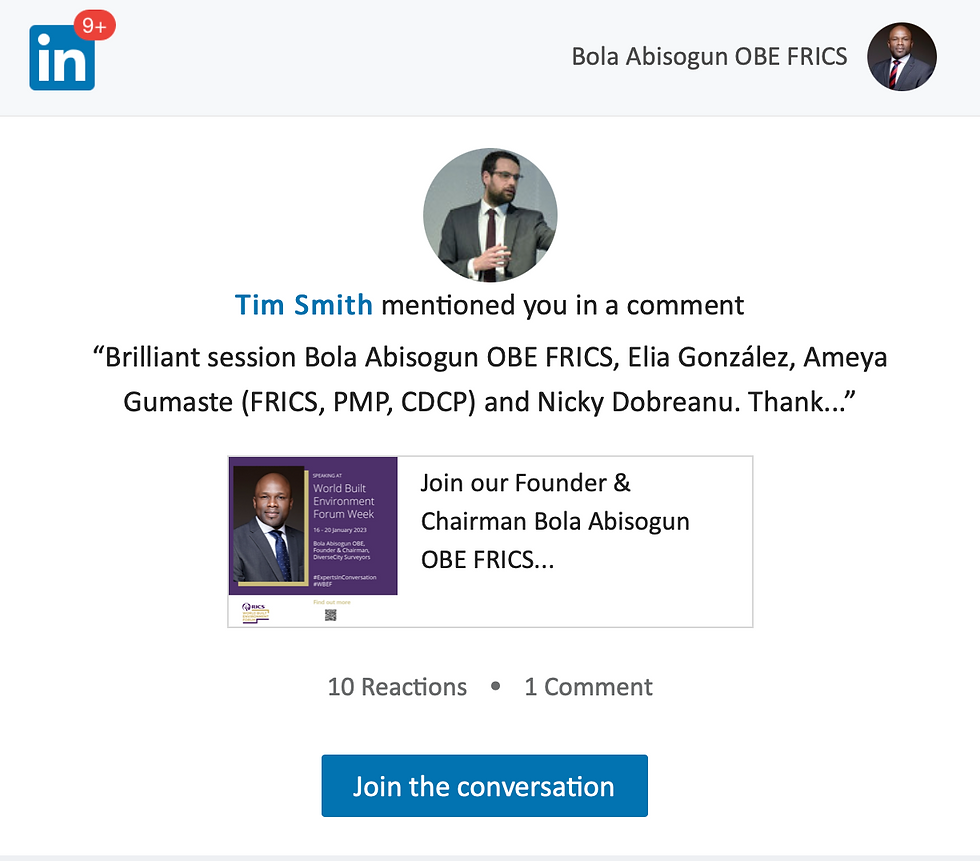
RICS WBEF _ credit to Tim Smith
Not even my commercial acumen accrued over 30years [actively deploying my PQS background] was sufficient to avoid an inevitable ‘challenge from the sector’; but the same unavoidable challenge that presented itself to me, back in 2017/18, is fast becoming the norm across the entire sector in the UK.

Credit: BIM Academy
Further exacerbated by an increasingly challenging commercial landscape that has ramped up the number of administrations during 4Q22, we are currently witnessing record numbers of business failures across the UK.

Credit: Business Day [Ng]
In the UK, we now have a perfect [post-BREXIT] storm, including a general lack of ‘engaged’ human capital, woefully low levels of ‘skilled’ capacity, an ageing and fragile workforce, glaring underinvestment in digital [and soft] skills, over-arching hyper-inflation, an increasingly erratic materials and labour induced cost pressure, amidst continuous ‘global’ supply chain disruption.

Credit: Construction Management
Add to that, a dire need for product traceability and an enhanced construction product information protocol, coupled with a focus on individual competence, it is no wonder that businesses are failing at the rate that they are across the UK.

Credit: BIM Academy
My love for 'traditional' construction management inspired my next chapter in #digitalconstruction:

Credit: Vanguard News [Ng]
So, let’s rewind back to November 2021, where the production of the #Wikipedia page on 06/11/21 (following that ‘other’ fateful day, 1st November 2021) was and remains a terribly 💔 sad day (and a forever reminder) for all in the #Nigerian construction sector. For the asset owner [i.e., Accountable Person] seeking to design, build and sell OR design, build, and maintain; greater confidence in the “capability, ethical integrity and professional competence” of #Nigerian construction professionals and artisans, must also become an acute priority in 2023. The banking and insurance sectors must be bolder in their collective ask and explicit project deliverables, that must include wider adoption [and appreciation] of digital tools and cloud-based solutions. Fortuitously for the Banks, as a means of ensuring timely and accurate payments [to the entire Supply Chain] without fear or favour; I’d be happy to explore ‘areas of low hanging fruit’ with the Senior Leadership Teams across all client groups. The fact is, Grenfell Tower was insured the day before and on the day of the tragic fire. Regrettably, the building should NEVER have successfully attracted insurance cover, and was in fact un-insurable. To that end, Insurance Underwriters need to adopt a completely different perspective and more intelligent approach to asset level risk, prior to, during and beyond, the now established third gateway.

Credit: Vanguard News [Ng]
‘As-built” now becomes ‘As-managed” in an accessible / interoperable digital format:
As the most populous country on the continent of Africa, the Nigerian construction and real-estate sector has huge potential, but #skills development [with a focus on #digitalskills] for those wholly unqualified to administer the entirety of the construction delivery process; is clearly underserved. Based upon my growing body of work via the #BuildingSafetyAct and across #digitalconstruction in the UK and more recently the USA, the latter via the London Chamber of Commerce & Industry 'LCCI' – I now want to focus the minds of every Nigerian construction professional ‘on-ground’ who can still affirm that they #loveconstruction.
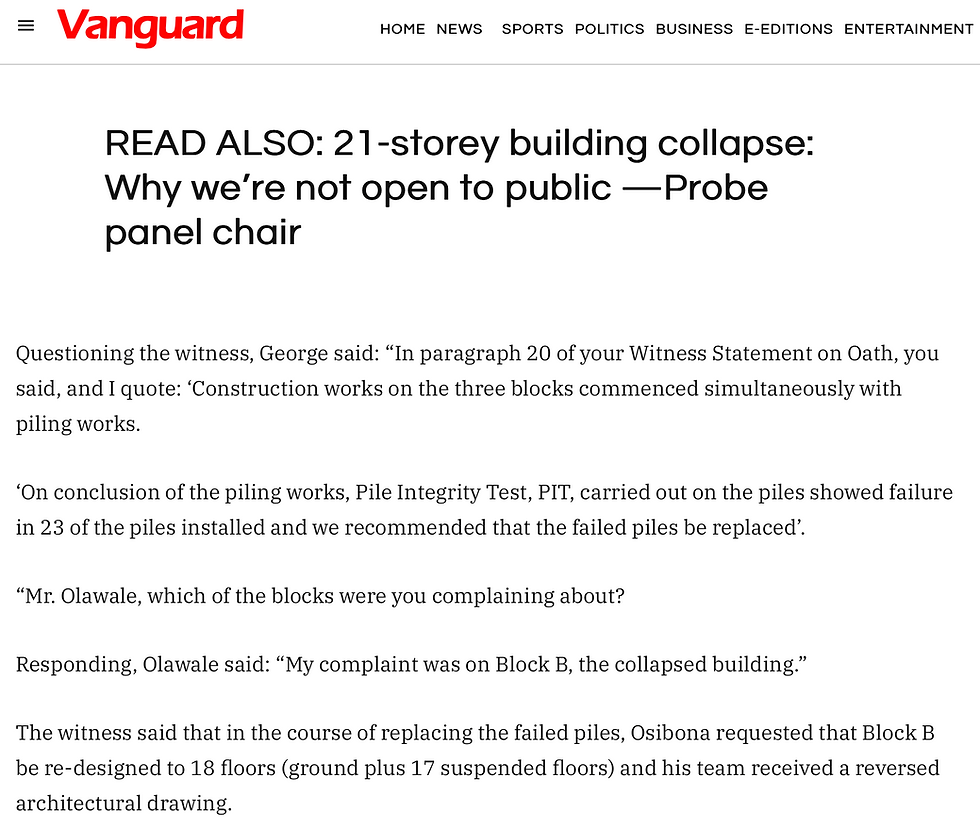
Credit: Vanguard News [Ng]
Following recent and inspiring conversations with colleagues ‘back home and on-ground’ _ including Giles Omezi RIBA [a UK trained and qualified Architect] and Hakeem Smith FRICS [a UK trained and qualified Chartered PQS], I am boldly making a call to the relevant Nigerian government officials at the FCT, in a bid to facilitate and ensure appropriate competency levels are achieved and maintained, by all indigenous talent.
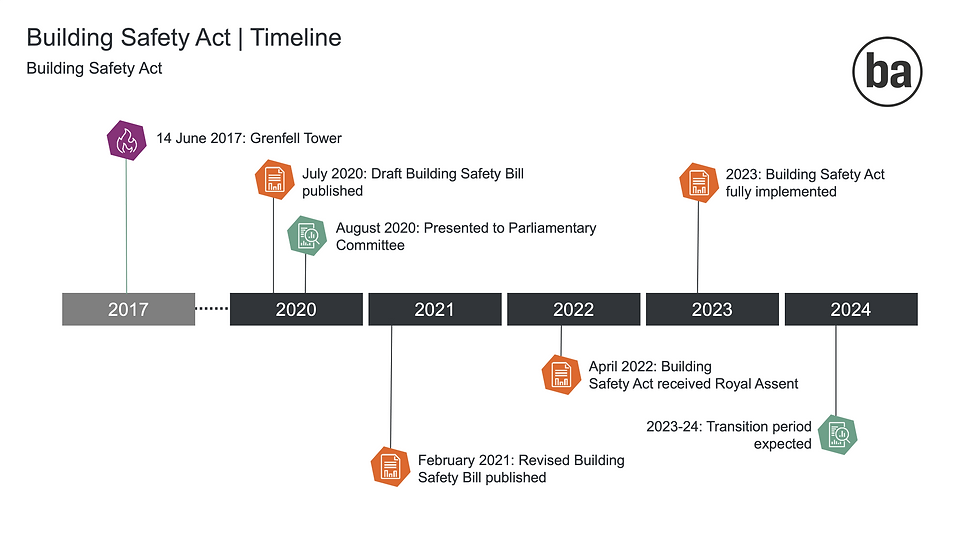
Credit: BIM Academy
Nigeria has effectively [and successfully] opted to phase out paper currency and chosen to adopt a ‘digital currency’ to expedite and support the adoption of ‘eNaira’ - and remains the first African country to do so on the continent.

That being the case, why not proceed to adopt ‘digital construction’ too, as a means of ensuring better, connected, and safer buildings, for outright sale, investment and/or occupation? Other early adopter sovereigns across the globe have already embarked upon this key and critical journey, but no other continent has greater potential for societal upside and seismic commercial returns [achieved in that order!] than Mother Africa herself. The multi-faceted, well documented business case has never been stronger and the intrinsic, commercial opportunity is gargantuan; the numbers are literally eye-watering. However, from a moral perspective, we owe it to every family that continues to mourn their loved ones, lost forever in the tragic building collapse in Ikoyi, just over a year ago.
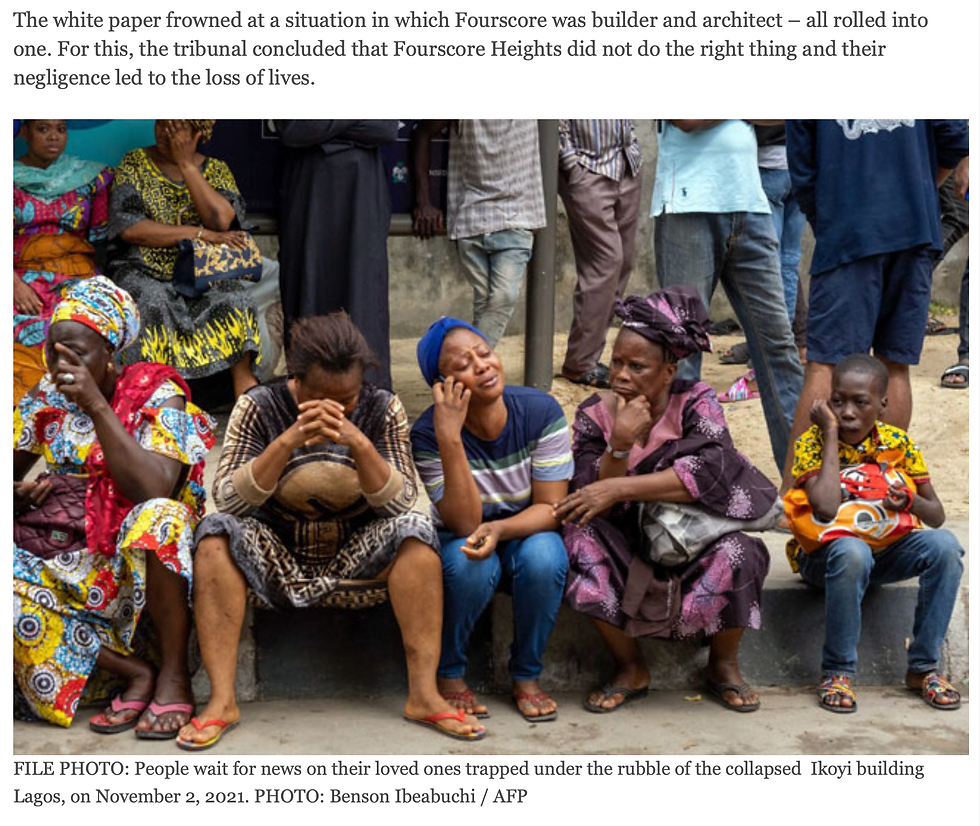
Credit: Channels TV [Ng]
Inspired by the continued effort led by Dame Hackitt and serving alongside other industry leaders in the UK [far too many to mention!], my own challenge to the UK government is now ‘largely and substantially’ complete, in the presence of the Building Safety Act (2022) noting the two key pillars of focus and the ‘evidence-based’ prevention of and assurance against (1) spread of fire and (2) structural collapse.

Credit: BIM Academy
Having said that, and in the presence of some thirty-seven (37?) pending pieces of secondary legislation, there is still another chapter of ‘finer detail’ yet to be navigated, but the basic tenets of thought and underlying principles have been successfully established in legal terms. Moreover, the biggest challenge is not transactional or even technological; not at all. Many in the UK will attest that, even in the presence of this five, near six-year journey of generational change, the biggest challenge for us all, is simply a cultural one, predicated solely on entrenched behaviours and attitudes. We must do better if we are to create a balanced and equitable environ for the next generation; and one where ‘personal greed’ becomes less acceptable.
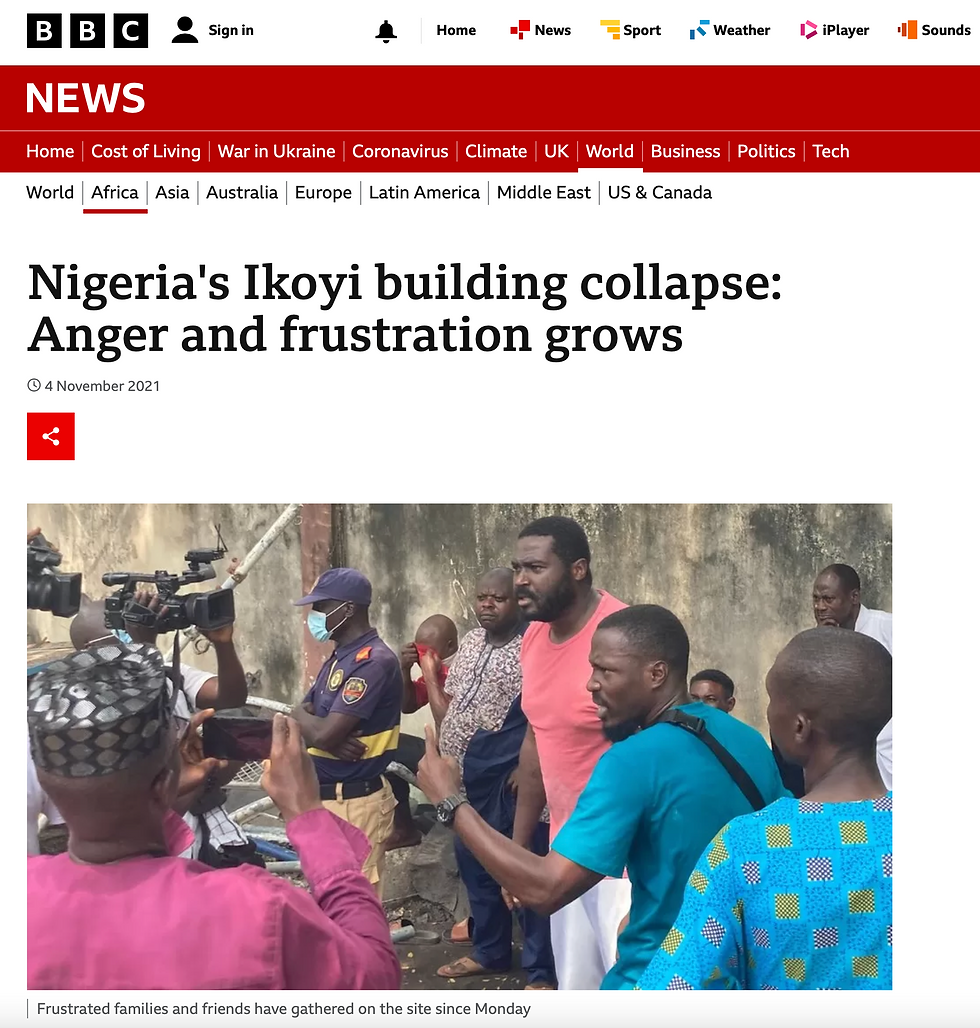
Credit: BBC NEWS Pidgin [November 2021]
In anticipation of the October 2023 deadline for registration, and in honour of every one of the seventy-two (72) lives lost in the Grenfell Tower tragedy, things will now have to change, as required by law in England. Conversely, and in honour of the estimated forty-two (42) lives lost in the Lagos tragedy [i.e. Building B, Fourscore Towers development, Gerrard Road, Ikoyi] and given that skills development, building standards and regulatory compliance can no longer remain ‘laissez faire’ in the UK [post-#Grenfell], I am now asking two very serious questions of the FCT via the Lagos State Building Control Agency.

Credit: Channels TV [Ng]
Key and critical questions for government officials:
(1) With a dire need to continue and successfully attract much needed FDI across the continent, amidst an evolving ‘tech native’ young and capable talent pool, specifically across Nigeria, “are we capable of structural and disruptive change?”
(2) With demonstrable levels of digital excellence across the general population, that is more than capable of embracing #digitalconstruction as a ‘new way of working’ _ “isn’t it time for a Building Safety Act for Nigeria?”

Credit: BIM Academy

Credit: Channels TV [Ng
God Bless Nigeria 🇳🇬 and all her citizens 🙏🏾 #IkoyiBuildingCollapse #PermittedDevelopment #BuildingSafety #SaferBuildings #ConstructionManagement #DigitalConstruction and #DigitalCostManagement because #PeopleMatter ahead of any #TripleBottomLine
Key References:
[FLASHBACK] Moment Owner of the 21 Storey Building That Collapsed in Lagos Featured on TVC News _ 6th August 2021
Nigeria's Ikoyi building collapse: Anger and frustration grows _ 4th November 2021
[WATCH] Body of Owner of Collapsed Ikoyi 21-storey Building, Femi Osibona Recovered from Debris _ 5th November 2021






Comments